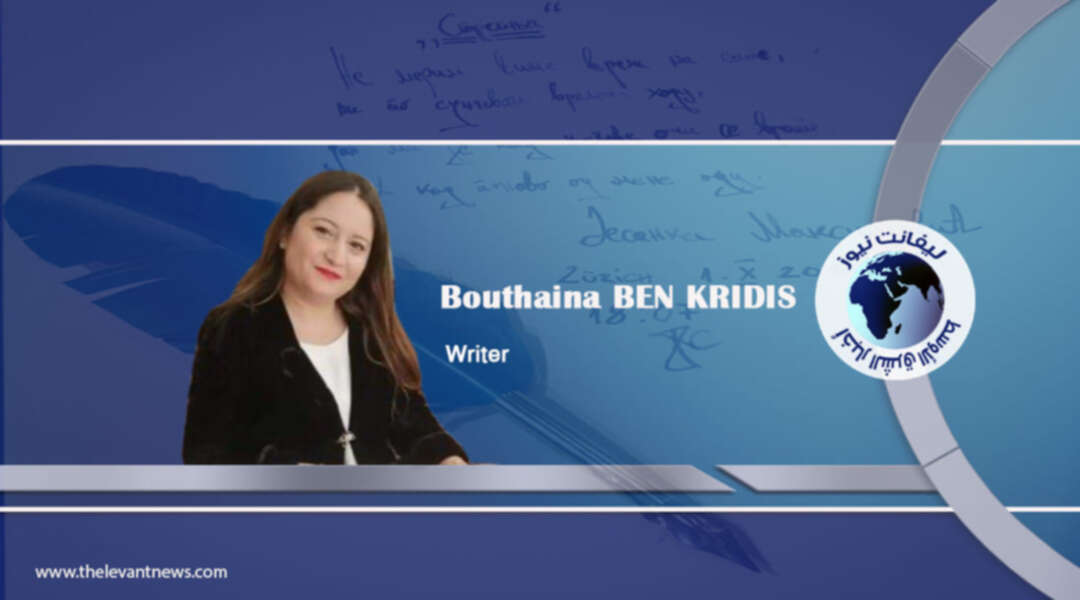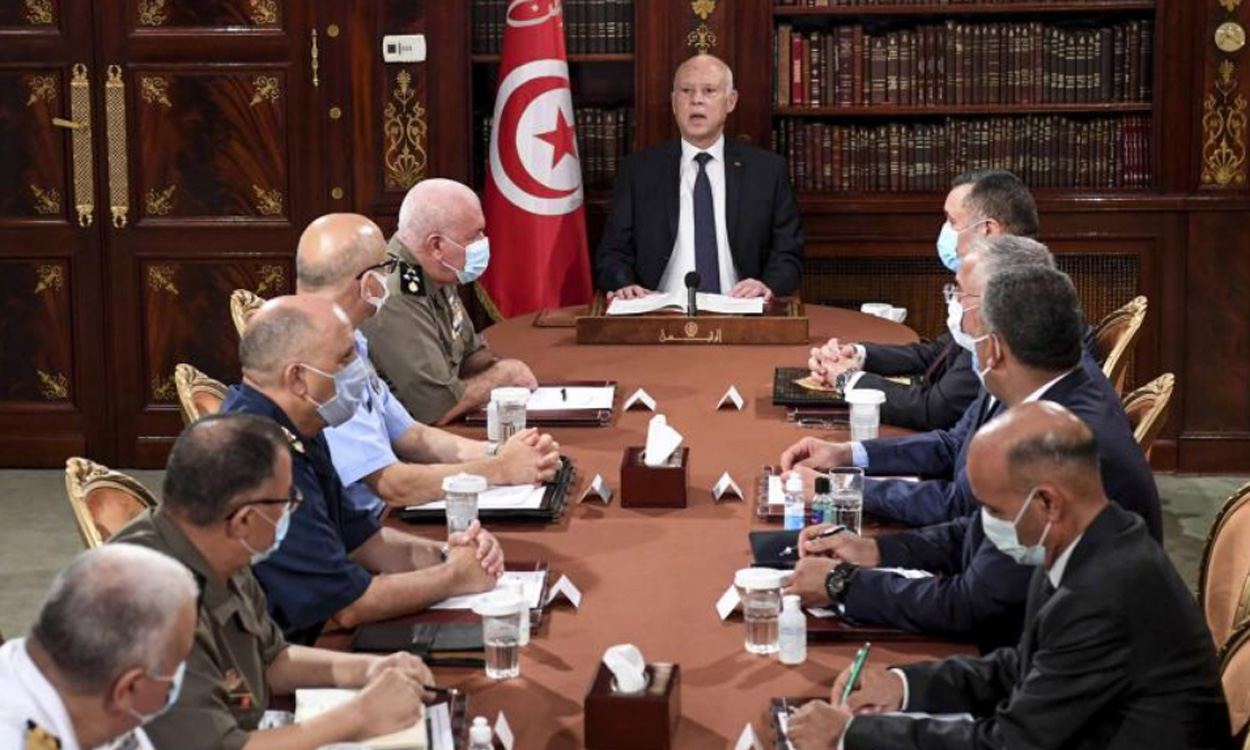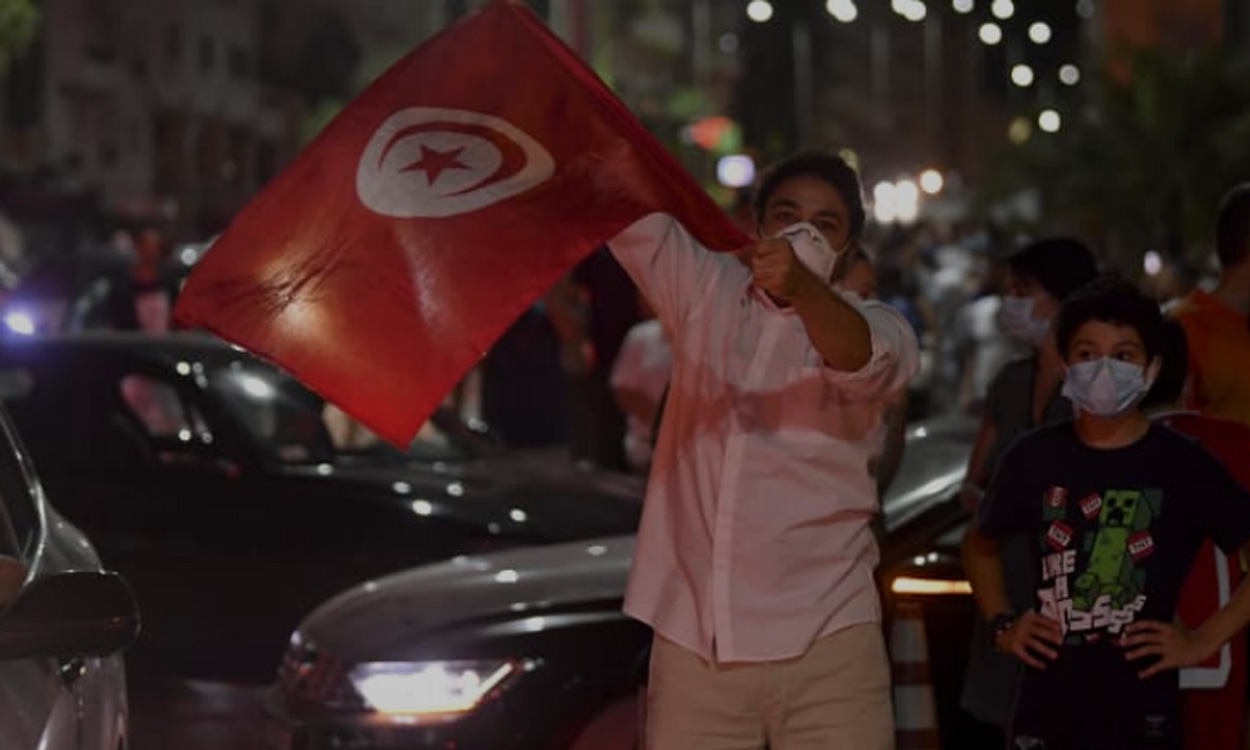-
The current political crisis in Tunisia

After a decade-long crawl towards democracy, this democracy appears exhausted and distorted. An increasing political instability has been fueled by serious problems including longer-standing issues of unemployment, crumbling infrastructure, severe health crisis due to the failure of the government to face COVID-19 pandemic, economic and political crisis, the absence of an action plan for the government, and the spread of corruption among parliamentarians and government members.
This deteriorating health, economic and social situation has resulted in the expansion of popular anger and the emergence of large anti-government protests, in the capital and different Tunisian regions. Protesters demanded the government’s removal and offices of the Ennahda party were attacked.

Political crisis becomes deeper and Tunisian democracy faces its biggest test after President Kais Saied invoked emergency powers under Article 80 of the constitution and ousted the government and froze parliament, on July 25th, 2021.
To understand the current Tunisian political crisis, it is important to answer the following questions: Is there a Coup? What are the main implications of the exceptional measures announced by President Saied? Are there any signs of international and national support for President Saied’s approach? What are the following steps according to the President Said prospected road map?
I)Is there a Coup:
On July 25th, Tunisia’s National day, in which a series of mass protests across Tunisia and in a Speech following an emergency meeting with military and security officers, the Tunisian President Kais Saied decided to activate Article 80 of the 2014 Tunisian Constitution. He froze the parliament, dismissed the prime minister, and lifted the immunity of all MPs. He also announced that he will take control of all presidential, executive, legislative and judicial powers. The president said that he will take charge of the executive power, with the help of the government, to be headed by a new leader appointed by the President of the Republic.
The opposition, especially the Speaker of the Assembly of the People's Representatives, accuses President Saied of carrying out a coup in Tunisia by assuming all powers through an alleged misinterpretation of Article 80 of the Constitution. However, I think that they are not right and the decisions taken by President Saied are not illegitimate. What happened in Tunisia cannot be considered a Coup. First, we cannot speak about a Coup in this case since there is an application of a constitutional text. A coup can be defined as an unconstitutional action by an individual or a group of people with a view to overthrowing the system of government and halting the constitution and this was not the case for the exceptional measures and decisions taken by President Saied.
Actually, using a broad interpretation of Article 80 by President Saied has raised concerns among public opinion and some resistance of constitutional law specialists but this does not mean that the article is not applied by the President and hence it is not a coup.
In fact, the use of Article 80 requires the existence of a State of Exception based on two correlative conditions: the existence of imminent danger and this danger should threaten the nation’s institutions or the security or independence of the country, and hampering the normal functioning of the state. The deteriorating health and political situation in Tunisia justifies the existence of the aforementioned conditions of the State of Exception (or “the exceptional circumstances” in Article 80). Based on these exceptional circumstances, President Saied took the necessary exceptional measures and decisions after consulting the Head of Government and the Speaker of the Parliament as stipulated in the Article. As to informing the President of the Constitutional Court, a formal condition, such a condition cannot be met due to the absence of a Constitutional Court (continuous political conflicts after the issuance of the 2014 Constitution have blocked the creation of the Constitutional Court).
Nevertheless, Article 80 itself is controversial since it uses broad language that leaves its interpretation to the President of the Republic. This gives the president the only discretionary power to decide if we are in a state of exception or not even if he abuses this power. This can be also justified by the absence of other powers which can decide whether there is a state of exception or not (even in the existence of advisory opinions they are not binding). Thus, the President has procedural power balances. Such a situation is described by French constitutional jurisprudence as “constitutional dictatorship”. Besides, the use of wide and imprecise wording especially “any measures necessitated by the exceptional circumstances” gives the President the power of choosing any measures he considers necessary.
Finally, we can also say that President Saied did not violate the provision of Article 80 stipulating that “the President of the Republic cannot dissolve the Assembly of the Representatives of the People''. Practically, President Saied froze the parliament instead of dissolving it. However, considering the parliament in a state of continuous session and the impossibility of presenting a motion of censure against the government, as mentioned in Article 80, these two conditions were not literally applied by President Saied and this can be justified by the fact of considering that the parliament and the government members themselves were the main reasons of the existence of “imminent danger threatening the nation’s institutions or the security or independence of the country, and hampering the normal functioning of the state”. In this context, President Saied emphasizes that legality should be in harmony with legitimacy and laws must not conflict with the will of the people.
I think that the constitutional controversy relating to Article 80 should also be viewed in light of the overlap between law and politics.
Be that as it may, activating this Article urges the need to recognize, at least, the following points:
The gravity of the current political situation
The difficulty of saving the country while keeping the current political system
The failure of the election system which requires reforms
II)What are the main implications of the exceptional measures announced by President Saied?
It seems that the tension continues to worsen after the president dismisses other members of the Government. Clashes started in the vicinity of Parliament especially between pro Saied and pro Ennahda Party which refused the suspension of the activities of the Parliament. In the future, I do not expect more clashes in the vicinity of Parliament precisely after the success of the National Army in securing the Parliament on the day following the presidential decisions, maintaining national peace and security, and guaranteeing the implementation of presidential decisions by preventing members of the frozen parliament from entering and holding an emergency session.
Based on the measures and decisions announced by the President, he issued a nationwide curfew for 30 days in addition to three presidential orders, which were issued in the Official Journal of the Republic of Tunisia No. 64, on July 26th, 2021, as follows:
- Presidential Order N°. 69 of 2021 (26, 07, 2021) relating to the dismissal of the Head of Government and members of the Government namely Hichem Mechichi, Head of Government and responsible for managing the affairs of the Ministry of the Interior, Ibrahim Barteji, Minister of National Defence, and acting justice minister Hasna Ben Slimane. By virtue of this presidential order, the secretaries-general or those charged with administrative and financial affairs at the head of the government and the aforementioned ministries shall conduct their administrative and financial affairs until a new prime minister and new members of Governments are named.
- Presidential Order No. 70 of 2021 concerning the prohibition of the movement of persons and vehicles in the entire territory of the Republic, from 7 p.m. to 6 a.m. from 26 July 2021 to 27 August 2021. The movement of persons and vehicles between cities is also blocked outside the time of the curfew. Every gathering of more than three people is prohibited in public roads and public arenas during the same period.
-Presidential Order No. 71 of 2021, dated 26 June 2021, concerning special provisions for the work of State agents, local communities and public institutions of an administrative character, which would suspend the operation of central administrations, external interests, local communities and public institutions of an administrative character for a period of two days beginning on June 27th, with the possibility of extending the duration of the suspension by a communication issued by the Presidency of the Republic. These special provisions were issued by President Saied, who took control of the general prosecutor's office, in an attempt to preserve documents and files of suspects in crimes.
Dismissals continued in the form of successive presidential decisions relating to the termination of the functions of advisers to the Head of Government, in charge of the Office of the Head of Government, General Secretary of Government, Director of the Office of the Head of Government, and the president of the Authority on Resistance Fighters, Martyrs and Wounded of the Revolution and Terrorist Operations.
In addition, a circular was signed by Kais Said to dismiss all Governors with a possibility of arresting more than 16 Governors. It is likely that dismissals will extend to other agents of local communities and financial control and accountability of parties and associations will extend. As said in the announcement to the Tunisian people, different and successive presidential orders will be issued during 30 days, the period of the exceptional measures.

III)Are there any signs of international and national support for President Saied’s approach?
At the international and regional levels, there is a general orientation to support President Saied’s approach and a confirmation of the continuous support of the Tunisian people's will and strengthening democracy through fighting corruption and violence and respecting citizens’ rights and liberties. In addition to supporting democracy and the rule of law, it is necessary to stress that fighting corruption and realizing economic stability are among the most important factors which will enhance Tunisia's position at the international level.
The EU has asked political actors in Tunisia to respect the Constitution and the rule of law. The International Monetary Fund expresses its readiness to continue to support Tunisia's economy to save it from crises. The United Nations calls on all parties to refrain from using violence. Germany denies the existence of a coup in Tunisia and confirms its support for democracy. France has expressed its interest in the developments in Tunisia and its support for the Tunisian people.
The Arab League emphasizes the support of the Tunisian people and the state's ability to operate effectively. Saudi Arabia expresses its interest in the security, stability and prosperity of Tunisia. Algeria and Morocco insist on their support to Tunisia and the Tunisian people in this difficult phase of the democratic transition with confirming the continuous solidarity with Tunisia. Saudi Arabia, the United Arab Emirates, and Egypt strongly support President Saied since they welcome any move to limit the influence of Islamists in Tunisia considering them as a source of threat of democratic transition and political stability in Tunisia.
At the national level, several Tunisians celebrated in the streets after President Saied decided to remove the prime minister and suspend parliament. Emrhod Consulting published on the evening of 28th July, 2021, the results of its latest opinion poll for July. For the period from July 26th to 28th, 2021, the poll showed 87 per cent public support for the President’s decisions. The survey covered a sample of 900 Tunisians whose age varies between 18 years and over.
Saied focuses on engaging the different actors in the Tunisian political and social scene towards finding effective solutions to the political crisis. The President of the Republic launches a series of consultations in an attempt to network with civil society organizations and national parties and organizations to set up the appropriate measures and road map for stability in Tunisia. President Saied has been somewhat successful in reassuring public opinion and gaining initial support from national institutions, civil society organizations and active unions in the country, including: Tunisian League for the Defense of Human Rights, National Syndicate of Tunisian Journalists, Tunisian Forum for Economic and Social Rights, the Supreme Judicial Council, Tunisian Association of the Democratic Women, the Tunisian Union of Agriculture and Fisheries, Tunisian Union of Industry Trade and Handicrafts (UTICA). Other civil organizations such as the Tunisian artists' syndicate and the Observatory for Defence of Civilian Nature of State supported the measures of President Saied.
Furthermore, different national Civic, civil society and trade union organizations, including The National Syndicate of Tunisian Journalists, Tunisian League for the Defense of Human Rights, The Tunisian General Labor Union (UGTT), Tunisian National Bar Association, Tunisian Association of the Democratic Women, The Association of Tunisian Judges, and Tunisian Forum for Economic and Social Rights have issued a joint statement calling the President to set a road map according to a clear calendar that does not exceed thirty days, in a participatory manner with all civil forces, related to urgent issues such as fighting COVID-19, initiating a review of the electoral law and the political system, and fighting corruption.
IV)What are the following steps according to the President Said prospected road map?

What happened in the last few days confirmed the lack of trust between Tunisians and the existing political class, the failure of the revolution to achieve its goals and the deviation from the revolution’s real principles. Indeed, the majority of the Tunisian people, especially the youth, have chosen to call what happened in Tunisia "correcting the course of the revolution", thus refuting the occurrence of a coup.
As a result of the aforementioned findings, we can conclude the necessity of focusing on the following needs:
The need to review existing laws and adapt them to the needs of the Tunisian people and the real objectives of the revolution
The need to put a road map and determine the goals of all reforms through consulting all the components of the Tunisian society, especially the Youth.
The following steps according to President Said road map can be reduced to the following points:
State rescue through guaranteeing the stability of the economic and health systems
Debate on resolving the political crisis through changes in the political system, electoral law and resorting to referendum
Expanding legal accountability and prosecution against symbols of corruption
The initiation of a penal settlement with those involved in the looting of public money, after a downward arrangement from the most involved to the least. President Saied announced that this point will be regulated by a law.
BY : Bouthaina BEN KRIDIS
You May Also Like
Popular Posts
Caricature
BENEFIT Sponsors BuildHer...
- April 23, 2025
BENEFIT, the Kingdom’s innovator and leading company in Fintech and electronic financial transactions service, has sponsored the BuildHer CityHack 2025 Hackathon, a two-day event spearheaded by the College of Engineering and Technology at the Royal University for Women (RUW).
Aimed at secondary school students, the event brought together a distinguished group of academic professionals and technology experts to mentor and inspire young participants.
More than 100 high school students from across the Kingdom of Bahrain took part in the hackathon, which featured an intensive programme of training workshops and hands-on sessions. These activities were tailored to enhance participants’ critical thinking, collaborative problem-solving, and team-building capabilities, while also encouraging the development of practical and sustainable solutions to contemporary challenges using modern technological tools.
BENEFIT’s Chief Executive Mr. Abdulwahed AlJanahi, commented: “Our support for this educational hackathon reflects our long-term strategic vision to nurture the talents of emerging national youth and empower the next generation of accomplished female leaders in technology. By fostering creativity and innovation, we aim to contribute meaningfully to Bahrain’s comprehensive development goals and align with the aspirations outlined in the Kingdom’s Vision 2030—an ambition in which BENEFIT plays a central role.”
Professor Riyadh Yousif Hamzah, President of the Royal University for Women, commented: “This initiative reflects our commitment to advancing women in STEM fields. We're cultivating a generation of creative, solution-driven female leaders who will drive national development. Our partnership with BENEFIT exemplifies the powerful synergy between academia and private sector in supporting educational innovation.”
Hanan Abdulla Hasan, Senior Manager, PR & Communication at BENEFIT, said: “We are honoured to collaborate with RUW in supporting this remarkable technology-focused event. It highlights our commitment to social responsibility, and our ongoing efforts to enhance the digital and innovation capabilities of young Bahraini women and foster their ability to harness technological tools in the service of a smarter, more sustainable future.”
For his part, Dr. Humam ElAgha, Acting Dean of the College of Engineering and Technology at the University, said: “BuildHer CityHack 2025 embodies our hands-on approach to education. By tackling real-world problems through creative thinking and sustainable solutions, we're preparing women to thrive in the knowledge economy – a cornerstone of the University's vision.”
opinion
Report
ads
Newsletter
Subscribe to our mailing list to get the new updates!






















